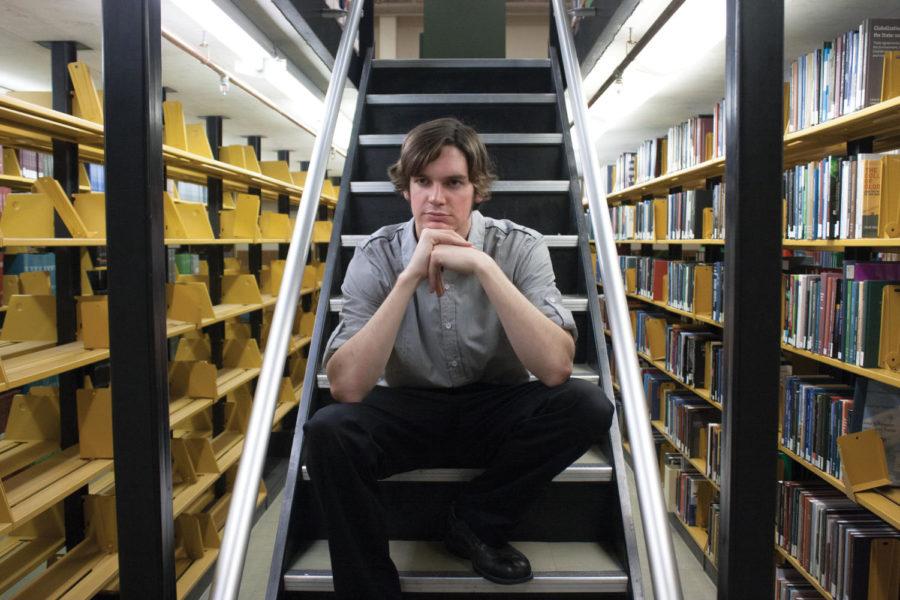More than a bad day
Photo: Andrew Clawson/Iowa State Daily
Sophomore in management information systems Vincent Hartogh suffered from depression until he talked to his parents and sought help through Student Counseling Services.
March 13, 2013
It was such a bad day that Vincent Hartogh, a student normally engaged in his classes, couldn’t even make himself get out of bed.
“I knew it was more than sad. It was really bad,” Hartogh said. “I knew that what I was feeling wasn’t natural.”
Hartogh, a sophomore in management information systems, experienced a common mental illness, depression, just last fall.
After spending his freshman year living in the residence halls, Hartogh moved off-campus, where he says he became disconnected from the Iowa State community.
He said he felt guilty for feeling so sad because there was no apparent reason for him to be that way.
“If you’re feeling that way, you’re feeling that way, whether or not you feel like you have a valid reason to be feeling that way,” Hartogh said.
Eventually, Hartogh’s depression got bad enough that he called his parents.
“Having to tell somebody, you know, you’re kind of messed up, is kind of scary,” Hartogh said.
His parents’ initial reaction was confusion.
“They just thought it came out of nowhere and were kind of confused about it, but they were very supportive,” Hartogh said.
Even after he had that conversation, it took Hartogh a couple of weeks before he sought professional help.
“Even when I told my parents how I was feeling, I didn’t really go that deep into what I was feeling, and just the idea of complaining to a stranger, I didn’t think it would really do anything for me,” Hartogh said.
Eventually, however, Hartogh made his way to Student Counseling Services.
“It was probably one of the scariest decisions I’ve ever made, which it doesn’t seem like it would be that scary, but it was really hard,” Hartogh said. “But I’m glad I did it.”
Student Counseling Services offers a variety of services, and is not limited to one-on-one counseling.
Among its services are biofeedback, tests that allow students to get feedback on what’s happening in their body at the moment by being hooked up to a heart rate monitor, workshops, meditation yoga at State Gym, walk-in appointments and a crisis hotline.
“It’s totally free for students. It is confidential, so anything they share is confidential within the center,” said Kate Sirridge, staff psychologist at Student Counseling Services.
Student Counseling Services had over 10,000 clinical appointments last year, most related to mood concerns, Sirridge said.
Sirridge said that now is one of the center’s busiest times of the year, due to stress from academics, weather and busy workloads. Another peak time is generally before Thanksgiving break.
Despite the array of services, students don’t always seek help because of stigmas surrounding mental health.
“I think there still is a stigma around mental health and utilizing counseling, so I think it can affect college students by making it more difficult to come into the counseling center,” Sirridge said.
She went on to add that she thinks, culturally, the stigmas are diminishing and students are much more likely to come into the clinic than before.
Hartogh said he had friends that didn’t fully realize the situation.
“Some friends I talked to about it were like, ‘Yeah, I don’t see how somebody can just, like, not stop feeling sad. Why can’t they just perk up and say, you know, tomorrow will be a better day?’” Hartogh said. “I just think a lot of people haven’t been there … so they can’t really see it and the full effects that it can have on people and the people around you.”
Hartogh said that he has yet to tell some of his close friends about his experience with depression, but he has found several new ways to cope with it.
“Stepping out of my comfort zone has helped me a lot, which is not always fun to do, but it really makes you challenge yourself and makes you kind of grow as a person,” Hartogh said.
Additionally, he has become more involved around campus. Hartogh recently joined a fraternity and also plays in a band.
“It is kind of a confidence builder, being a part of something and knowing that you do have something to offer to others,” Hartogh said.
Sirridge said a way students are taught to deal with depression is to change their way of thinking, and Hartogh said he did just that.
“I don’t necessarily have to feel 100 percent every day. I can have a bad day, but that doesn’t mean that things won’t be different tomorrow,” Hartogh said.
Three of the most common problems Student Counseling Services tries to prevent are depression, anxiety and relationship complications.
“I think that we can catch students early on and give them skills and prevent things from escalating,” Sirridge said.
As far as recovery goes, Sirridge said students may continue to deal with symptoms, but that they continue to work to get rid of them.
In the case of Hartogh, who said he feels okay now, reaching out to others has become key.
“If I could be in a position where I could … say, ‘Hey, I’ve felt this way before,’” Hartogh said, “it makes it seem a lot less scary knowing that other people have gone through it.”

















